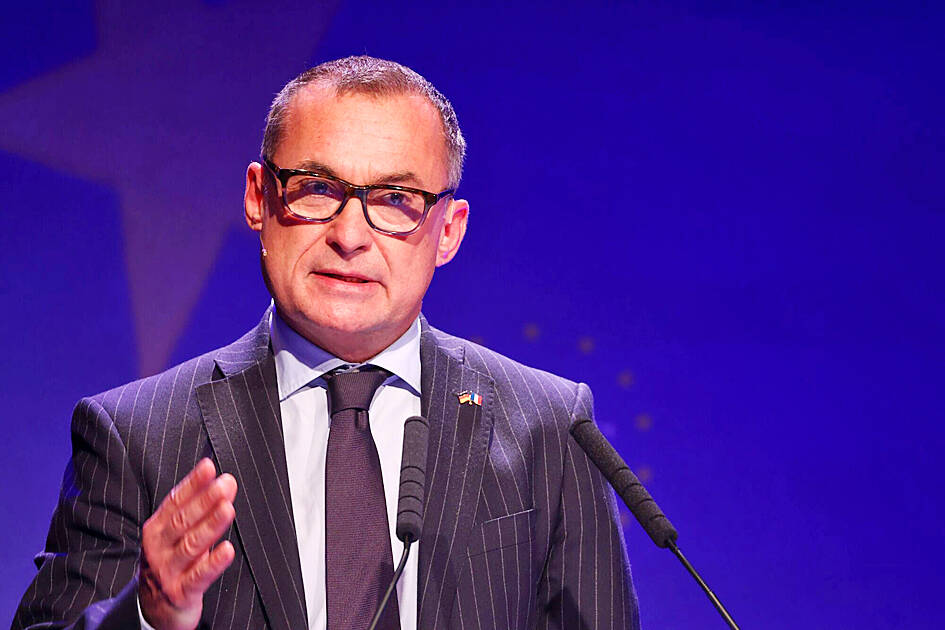Germany is particularly vulnerable to US trade tariffs, which could curb growth for years to come and hold back an economy already suffering through two straight years of contraction, Deutsche Bundesbank President Joachim Nagel said yesterday.
Germany, Europe’s largest economy, has been in a deep industrial recession, due in great part to subsidized Chinese output crowding out German products at a time when soaring energy costs at home are already weighing on competitiveness.
Modelling projections based on tariff threats from US President Donald Trump, the Bundesbank concluded that Germany would suffer but the US would also take a hit that would more than offset any positive impact of the trade barriers.

Photo: Alex Kraus, Bloomberg
“Our strong export orientation makes us particularly vulnerable,” Nagel said in a speech. “Economic output in 2027 would be almost 1.5 percentage points lower than forecast,” he added.
The Bundesbank sees the German economy growing by 0.2 percent this year and 0.8 percent next year, suggesting that a 1.5 percentage point hit over the next three years would result in more economic contraction.
“Contrary to what the (US) government has announced, the consequences of the tariffs for the USA should therefore be negative,” Nagel added. “The loss of purchasing power and increased costs for intermediate inputs would outweigh any competitive advantages for US industry.”
Bank of Italy Governor Fabio Panetta has also concluded that the US would take a large hit.
Speaking on the weekend, he said that if all tariffs hinted at by Trump before the election were implemented and they were followed by retaliatory measures, global GDP growth would fall by 1.5 percentage points with the US economy suffering a 2 percentage point hit.
The big risk, Panetta argued, was that Chinese firms shut out of the US would seek new markets and could squeeze out European producers.
The Bundesbank’s models on inflation were less conclusive.
One saw only a minor impact while another anticipated a large increase in price pressures because retaliatory tariffs would be passed onto consumers while a weak euro would weigh on import costs, Nagel added.

Zhang Yazhou was sitting in the passenger seat of her Tesla Model 3 when she said she heard her father’s panicked voice: The brakes do not work. Approaching a red light, her father swerved around two cars before plowing into a sport utility vehicle and a sedan, and crashing into a large concrete barrier. Stunned, Zhang gazed at the deflating airbag in front of her. She could never have imagined what was to come: Tesla Inc sued her for defamation for complaining publicly about the vehicles brakes — and won. A Chinese court ordered Zhang to pay more than US$23,000 in

Taiwan Semiconductor Manufacturing Co (TSMC, 台積電) yesterday said that its investment plan in Arizona is going according to schedule, following a local media report claiming that the company is planning to break ground on its third wafer fab in the US in June. In a statement, TSMC said it does not comment on market speculation, but that its investments in Arizona are proceeding well. TSMC is investing more than US$65 billion in Arizona to build three advanced wafer fabs. The first one has started production using the 4-nanometer (nm) process, while the second one would start mass production using the

A TAIWAN DEAL: TSMC is in early talks to fully operate Intel’s US semiconductor factories in a deal first raised by Trump officials, but Intel’s interest is uncertain Broadcom Inc has had informal talks with its advisers about making a bid for Intel Corp’s chip-design and marketing business, the Wall Street Journal reported, citing people familiar with the matter. Nothing has been submitted to Intel and Broadcom could decide not to pursue a deal, according to the Journal. Bloomberg News earlier reported that Taiwan Semiconductor Manufacturing Co (TSMC, 台積電) is in early talks for a controlling stake in Intel’s factories at the request of officials at US President Donald Trump’s administration, as the president looks to boost US manufacturing and maintain the country’s leadership in critical technologies. Trump officials raised the

From George Clooney to LeBron James, celebrities in the US have cashed in on tequila’s soaring popularity, but in Mexico, producers of the agave plant used to make the country’s most famous liquor are nursing a nasty hangover. Instead of bringing a long period of prosperity for farmers of the spiky succulent, the tequila boom has created a supply glut that sent agave prices slumping. Mexican tequila exports surged from 224 million liters in 2018 to a record 402 million last year, according to the Tequila Regulatory Council, which oversees qualification for the internationally recognized denomination of origin label. The US, Germany, Spain,